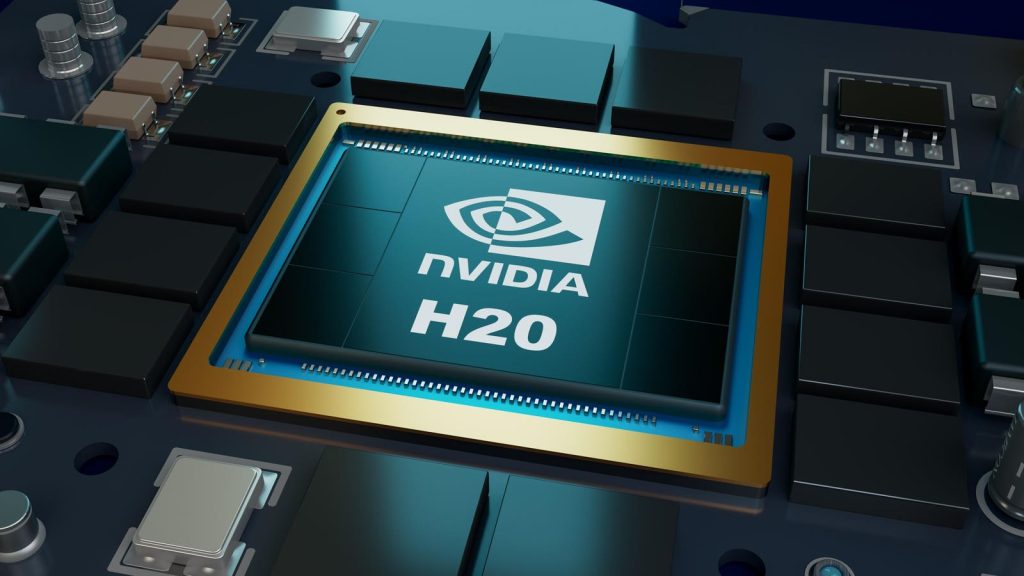Topline
Shares of Nvidia and AMD fell in premarket trading early on Monday, after reports said both companies have agreed to pay 15% of the revenue generated on AI chip sales to China to the U.S. government, as part of an unconventional deal with the Trump administration to secure export licenses.
Nvidia has reportedly agreed to pay the U.S. government 15% of the revenue its generates from H20 AI chip sales to China.
VCG via Getty Images
Key Facts
According to the Financial Times, which first reported on the matter, Nvidia will pay the 15% cut on the revenue it generates from the sale of its H20 AI chips, a cut-down version of its H100 chip designed to comply with export rules on China.
AMD has also agreed to pay a similar cut on the sales of its MI308 chip designed for China, the report added.
Citing an unnamed U.S. official and others familiar with discussions, the FT report said the deal was a necessary condition for the China export licenses granted to the companies last week.
It is unclear if these 15% export levies will raise the price of these chips for Chinese buyers.
In premarket trading early on Monday morning, Nvidia’s shares dropped 1.16% to $180.61, while AMD’s slipped 2.3% to $168.79.
U.S. government officials and AMD have not yet publicly commented on the matter, but an Nvidia spokesperson told various outlets that the company hasn’t “shipped H20 to China for months,” but it hopes “export control rules will let America compete in China and worldwide.”
How Much Could The U.s. Government Earn From This Deal?
In May this year, Nvidia CEO Jensen Huang told the Stratechery Podcast that he estimates Nvidia could earn $15 billion from H20 chip sales to China. This means the U.S. government stands to earn as much as $2.25 billion from the AI chipmaking giant as part of this deal. In its Q2 2025 earnings call last week, AMD reported a $800 million write-off due to restrictions on the exports of its MI308 chips to China. If the company’s China sales projections are accurate, the U.S. government could earn another $120 million.
What Do We Know About U.s. Chip Export Controls For China?
In an SEC filing made in April, Nvidia disclosed that the Trump administration had placed additional restrictions on the exports of its H20 AI chips to “China (including Hong Kong and Macau),” or to companies headquartered in the country. At the time, the company said the restrictions would result in a $5.5 billion hit in its first-quarter financial results. Last month, Huang met Trump at the White House, where he reportedly urged the president to allow his company to restart H20 sales to China, arguing that the export controls would weaken the U.S.’s edge in artificial intelligence and semiconductors. A few days after the meeting, Nvidia announced that it plans to resume H20 sales in China after the U.S. government “assured” the company that the “licenses will be granted.” The Financial Times reported last week that the commerce department has started issuing the licenses to Nvidia, allowing it to export its cut-down AI chips to China.
Chief Critics
Last month, a group of 20 national security experts and former government officials wrote to Commerce Secretary Howard Lutnick, raising concerns about the export license approval. “We believe this move represents a strategic misstep that endangers the United States’ economic and military edge in artificial intelligence (AI)—an area increasingly seen as decisive in 21st-century global leadership,” the letter said. “The decision to ban H20 exports earlier this year was the right one. We ask you to stand by that principle and continue blocking the sale of advanced AI chips to China as America works to maintain its technological edge. This is not a question of trade. It is a question of national security.” The signatories of the letter included Matt Pottinger, who serves as the deputy national security adviser during Trump’s first term, and Stewart Baker, who served as Assistant Secretary of Homeland Security for Policy during the George W. Bush administration. In a Wall Street Journal op-ed on Sunday Pottinger and Liza Tobin, who served as the China director of the White House’s National Security Council between 2019-21, wrote: “The controls on Nvidia’s H20 chips appear to have been working until CEO Jensen Huang’s lobbying secured a reversal that handed Beijing exactly what it wanted.” On the 15% cut deal, Tobin told the New York Times: “This is the Trump playbook applied in exactly the wrong domain. You’re selling our national security for corporate profits.”
Crucial Quote
In an interview with CNBC last month, Lutnick defended the administration’s decision to allow H20 exports to China, describing it as Nvidia’s “fourth best” chip. “We don’t sell them our best stuff, not our second best stuff, not even our third best,” the commerce secretary said. “We want to keep having the Chinese use the American technology stack, because they still rely upon it…The idea is the Chinese are more than capable of building their own. You want to keep one step ahead of what they can build, so they keep buying our chips.”
Nvidia and AMD to pay 15% of China chip sale revenues to US government (Financial Times)

